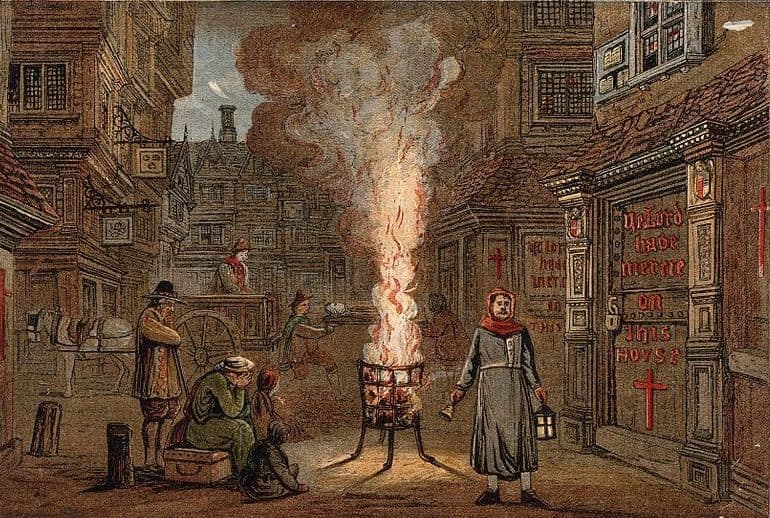Poem of the Day: ‘In Time of Plague’
To read about the Elizabethan era is to come across Nashe’s name again and again. Whenever something was happening in that era’s literary world, the man was sure to pop up.

What is one to make of Thomas Nashe (1567–c. 1601)? He was certainly once considered a major Elizabethan — by, say, Francis Turner Palgrave in his standard Victorian anthology of English lyrical verse, “The Golden Treasury,” where Nashe’s “Spring, the sweet spring, is the year’s pleasant king” is the first poem in the book. These days, however, Nashe ranks among the least read of the Elizabethans from whom the the Sun has drawn a Poem of the Day: Spenser (1552–1599), for example, or Shakespeare (1564–1616), Sidney (1554–1586), Marlowe (1564–1593), and all the rest.
Still, to read about that era is to come across Nashe’s name again and again. Whenever something was happening in the Elizabethans’ literary world, the man was sure to pop up. Plays, poetry, fiction, ecclesiology, social satire: At some point Nashe was involved. It’s debated how much he contributed to Shakespeare’s 1591 “Henry VI, Part 1,” but Nashe’s 1592 “Pierce Penniless his Supplication to the Divell,” a satirical prose tale, was among the most popular pamphlets of his time. And then there’s his 1594 “The Unfortunate Traveller,” a picaresque proto-novel, and then his erotica, and then his defenses of the state church, and then . . .
Along the way, in 1592, Nashe also wrote a masque called “Summer’s Last Will and Testament,” which contains some of his best lyrical poems: “Fair summer droops,” for example, and “Autumn hath all the summer’s fruitful treasure,” and today’s Poem of the Day, “In Time of Plague” (often named by its first line, “Adieu, farewell, earth’s bliss”). Each of the six seven-line trimeter stanzas is formed from three rhymed couplets followed by the refrain “Lord, have mercy on us!”
A memento-mori admonition — “Heaven is our heritage, / Earth but a player’s stage,” it reminds us — the poem contains the much-quoted line “Brightness falls from the air.” There’s some scholarly quibbling about how that may mistranscribe Nashe’s “hair” for “air,” but the image is too good to give up — for our reminder of death is, in fact, that brightness does fall from the air as we age.
In Time of Plague
by Thomas Nashe
Adieu, farewell, earth’s bliss;
This world uncertain is;
Fond are life’s lustful joys;
Death proves them all but toys;
None from his darts can fly;
I am sick, I must die.
Lord, have mercy on us!
Rich men, trust not in wealth,
Gold cannot buy you health;
Physic himself must fade.
All things to end are made,
The plague full swift goes by;
I am sick, I must die.
Lord, have mercy on us!
Beauty is but a flower
Which wrinkles will devour;
Brightness falls from the air;
Queens have died young and fair;
Dust hath closed Helen’s eye.
I am sick, I must die.
Lord, have mercy on us!
Strength stoops unto the grave,
Worms feed on Hector’s brave;
Swords may not fight with fate,
Earth still holds ope her gate.
“Come, come!” the bells do cry.
I am sick, I must die.
Lord, have mercy on us!
Wit with his wantonness
Tasteth death’s bitterness;
Hell’s executioner
Hath no ears for to hear
What vain art can reply.
I am sick, I must die.
Lord, have mercy on us!
Haste, therefore, each degree,
To welcome destiny;
Heaven is our heritage,
Earth but a player’s stage;
Mount we unto the sky.
I am sick, I must die.
Lord, have mercy on us!
___________________________________________
With “Poem of the Day,” The New York Sun offers a daily portion of verse selected by Joseph Bottum with the help of the North Carolina poet Sally Thomas, the Sun’s associate poetry editor. Tied to the day, or the season, or just individual taste, the poems are drawn from the deep traditions of English verse: the great work of the past and the living poets who keep those traditions alive. The goal is always to show that poetry can still serve as a delight to the ear, an instruction to the mind, and a tonic for the soul.
